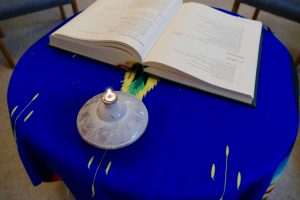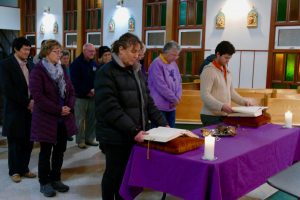HOMILY SUNDAY 03 – YEAR A
Sunday of the Word of God:
Repent, Believe, and Follow Jesus into the Kingdom
(Isaiah 9:1-4; Psalm 27; 1 Cor 1:10-13; 17-18; Mt 4:12-23)
********************************************************
An elderly lady was mailing a bible at the post office. When the clerk asked her if there was anything breakable in the package, she replied, “Yes – the Ten Commandments.”
 Today has been declared a special Sunday of the Word of God by Pope Francis, who wants Catholics everywhere to make the Word of God more central to their lives. I believe this will be an important part of his legacy, just as the Luminous Mysteries of the rosary are part of the legacy of Pope JP II.
Today has been declared a special Sunday of the Word of God by Pope Francis, who wants Catholics everywhere to make the Word of God more central to their lives. I believe this will be an important part of his legacy, just as the Luminous Mysteries of the rosary are part of the legacy of Pope JP II.
The Word of God today has a clear message for us – repent, believe, and follow Jesus into the Kingdom of God.
First of all, though, the gospel reminds us Jesus fulfills that beautiful prophecy of Isaiah we hear at Christmas time, that a light has shone and overcome the darkness in our world. How thrilling to know that all those Old Testament prophecies, written hundreds and even thousands of years before Christ, are all completely fulfilled in him, the Word made flesh and the Light of the world.
Then we hear Jesus preach his first message – repent and believe because the kingdom of God is near. The word repent comes from the Greek word metanoia. Meta means “highest” and Noia comes from nous, the Greek word for mind. So, to do metanoia is to put on our highest mind, to be the very best person we can possibly be. The Greek word for sin is harmatia, which means “falling short” – like an arrow that fails to reach its target. So, Jesus is urging us to reach our goal, to be the person God wants us to be.
Then, in the parallel passages to this gospel, Jesus asks us to believe, to put our complete faith and trust in him as the Word made flesh, the Light of the world, the Son of God, the Messiah who came to redeem and to sanctify, to forgive and to heal. Step three of the 12 Step program of AA expresses this well: “Made a decision to surrender our lives and wills to the care of God as we believe in God.
Jesus then proclaims his kingdom is near. In Luke 17:21, he goes one step further, and proclaims his kingdom is among us, a present reality. That is my motto as a bishop – Regnum Dei Intro Vos, “The kingdom of God is among you.” According to St. Paul, the kingdom of God is the peace, joy and justice of the Holy Spirit.
Immediately after, Jesus call disciples to follow him. Simon and Andrew were casting their nets, symbolizing the missionary task of the church, to go out and evangelize the world as missionary disciples. That is our motto as Oblates of Mary Immaculate – Evangelizare Pauperibus Misit Me – “He has sent me to evangelize the poor.”
I recall a conversation with a Hindu computer programmer on a flight to India years ago that became inter-religious dialogue. I asked him what kind of relationship he had with his gods, and got the impression it was very impersonal – they go to the temple, offer money to the priests for sacrifices, then go home, hoping the gods will be content and leave them alone. I then freely shared with him my relationship with God as Trinity, an intimate relationship, family, a divine dance, and in Jesus as my best friend. I am not sure what difference that conversation made in his life, but I felt deep joy in sharing my faith with him. I had cast my net as a missionary disciple.
Two of the disciples, James and John, were in the boat but mending their nets. This symbolizes the need of the church to always be in a process of healing, of growth, or renewal. That renewal can and should hinge upon the Word of God.
As a happy coincidence, yesterday the church celebrated the feast of the conversion of St. Paul. He is an excellent example of someone who was transformed by an encounter with the Word of God. He was a zealous Jew, righteously persecuting what he saw was a break-away sect of Judaism following a rebellious Jewish leader who had been executed. Then he met the Risen Jesus on the road to Damascus, and heard his voice identifying himself with his followers Saul was persecuting. That changed his whole belief system. He realized Jesus was truly the Messiah, risen Lord or Kyrios of all creation, and how forgiven he was for all his past mistaken theology. Knowing the love of Christ then became central to his life, and nothing could stop him from proclaiming this Good News to the world, to the point of giving his life for it.
Pope Francis wants us to make the word of God central to our lives as disciples of Jesus Christ and members of the Church. I would like to make three practical suggestions:
A first would be to practice Lectio Divina. A lady called me one day to complain she could no longer pray. Knowing her story and how faith-filled she was, I thought that was not really her problem – she was just ready for a more mature kind of prayer, and so I explained Lectio Divina to her and off she went.
Lectio Divina is an ancient manner of praying being rediscovered today in the church. It involves four stages: lectio, meditatio, oratio and contemplatio. Lectio is prayerfully reading a passage of scripture. Meditatio is thinking about it and asking ourselves what is God saying to us through this word. Oratiois an intimate conversation with Jesus about this word and praying with it for the needs of the world. Contemplatio is putting all thoughts and feelings aside and just resting in God’s presence soaking up God’s love. This prayer of quiet and silence gives God’s powerful word an opportunity to heal us at a deeper level than any counseling or therapy can accomplish
 A second suggestion would be to prepare for each Sunday celebration by reading the whole chapter from which the Sunday gospel is taken, giving us the broader context for the words we will hear proclaimed. For instance, this Sunday that chapter begins with the temptations of Jesus in the desert, and ends with him healing hordes of people coming to him from all directions out in the wilderness of Judea, and not in the temple, signifying God’s love reaching out to us wherever we are, and not just to those involved in sacrificial temple worship in Jerusalem.
A second suggestion would be to prepare for each Sunday celebration by reading the whole chapter from which the Sunday gospel is taken, giving us the broader context for the words we will hear proclaimed. For instance, this Sunday that chapter begins with the temptations of Jesus in the desert, and ends with him healing hordes of people coming to him from all directions out in the wilderness of Judea, and not in the temple, signifying God’s love reaching out to us wherever we are, and not just to those involved in sacrificial temple worship in Jerusalem.
A last suggestion Pope Francis also makes is to read scripture daily. I would recommend beginning with one of the gospels, to hear the story of Jesus, then move on to read the Acts of the Apostles, to hear the story of the early church, then go back to one of the gospels. I try to read a chapter of the bible every day, beginning with Genesis and ending with Revelation, and then start over with a different bible.
The Eucharist is based on our Jewish roots – the synagogue and the temple sacrifice. The Liturgy of the Word is our synagogue, and the Liturgy of the Eucharist is our temple, only we do not need to offer animal sacrifice. Instead we offer to God the greatest gift of all, – the loving sacrifice of his own Son.
So, may our celebration today on this special Sunday of the Word help us repent, believe, and follow Jesus into the Kingdom by making the Word of God central to our lives.




Well , it is a great homily and reflection in trying to get people to hear the word of God . Which is repent , believe and follow Jesus into the Kingdom of God. We are all sinners until we renew our baptism by having the holy water wash away our sins. Let go of all negative thoughts , actions, stubbornness, selfishness and resentments that tempting us to sins. We should be putting God or Jesus the center of our lives and making the word of God central to our lives when we pray , meditate and practice Lection Divina . During celebrations , we should prepare ourselves to celebrate Jesus’ life, passion , death and resurrection by making his word the center of our lives when we receive the communion. So, we should praise and worship him like he is number one in our lives and establish intimate relationship with him. Amen. Praise to the Lord Jesus Christ.
It is a lovely homily and teachings . I agree with the comment made by Pope Francis about spending g time to read and ponder over the scriptures . We should practice the Lection Divina in order to be closer to Jesus Christ. Do we understand the readings in the bible. Some people have a hard time reading the bible and understanding it. Do we understand the word of God. I have a gift to understand the bible and ponder over it. Thanks again Bishop Sylvain Lavoie . ??????????✝?❤️❤️